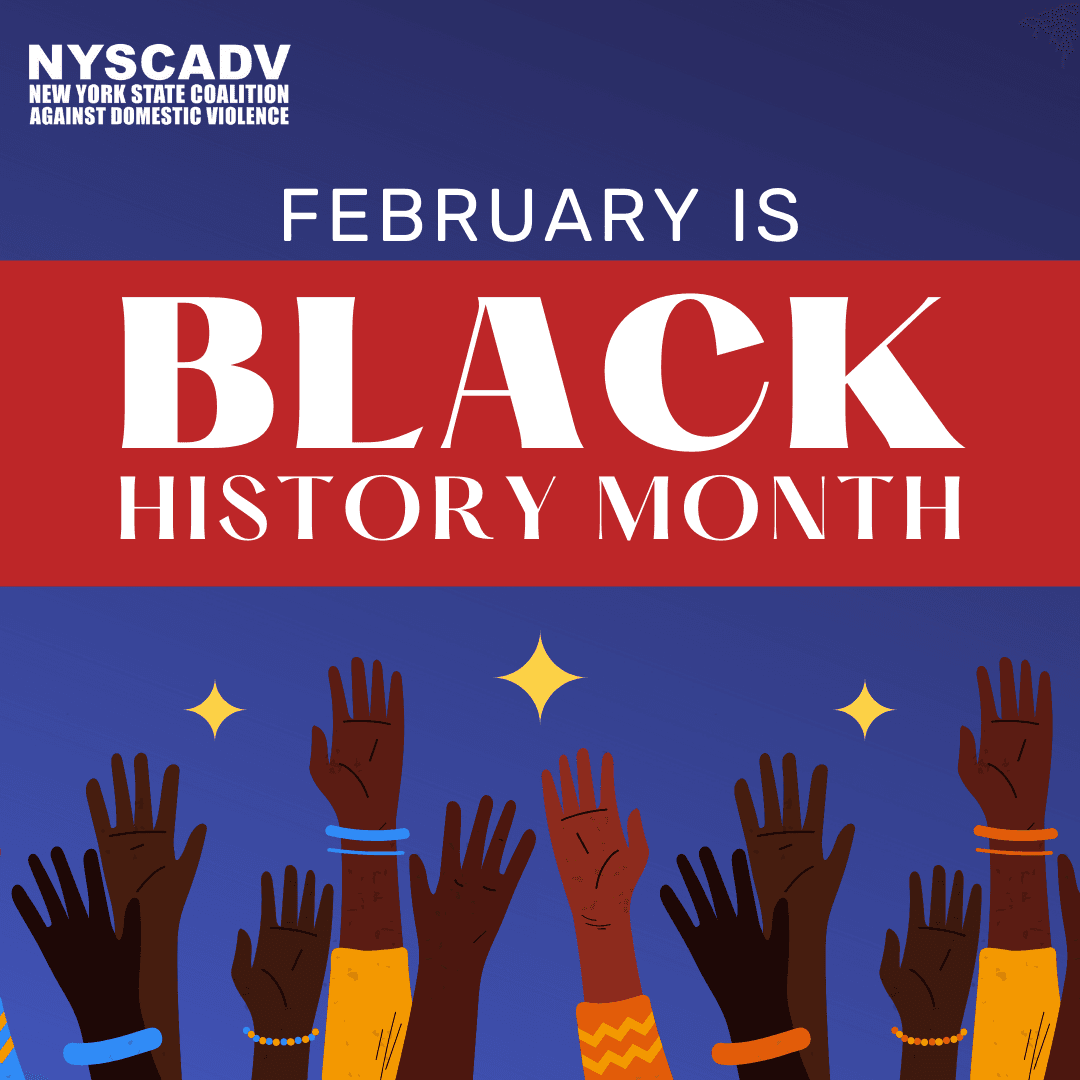
Black history month is an annual event recognizing the pivotal role in U.S. history and the achievement of African Americans. NYSCADV would like to acknowledge and honor the Black, Indigenous and People of Color (BIPOC) leaders, advocates, and organizations working to end systemic oppression and discrimination and ensure racial justice principles inform our work. Their tireless efforts to lift the experiences of BIPOC survivors of domestic violence as it intersects with all forms of oppression and discrimination, and racism, in particular, is critical to our work to prevent and end intimate partner and gender-based violence.
This year's theme for Black History Month is Black Health and Wellness. Domestic/Intimate Partner Violence is the # 1 health issue among black women today. Black survivors of domestic violence experience some of the highest rates of intimate partner violence:
According to the 2010-2012 National Intimate Partner and Sexual Violence Survey, 45% of Black women experienced contact sexual violence, physical violence, and/or stalking by an intimate partner in their lifetime. The same survey found that 40% of Black men experienced contact sexual violence, physical violence, and/ or stalking by an intimate partner in their lifetime.
The National Intimate Partner and Sexual Violence Survey also reported that approximately 41% of Black women had experienced physical violence by an intimate partner during their lifetime compared to 31% of White women, 30% of Hispanic women and 15% of Asian or Pacific Islander women.
CDC also reported in Racial and Ethnic Differences in Homicides of Adult Women and the Role of Intimate Partner Violence — the United States, 2003–2014, that Black and American Indian/Alaska Native women experienced the highest rates of homicide (4.4 and 4.3 per 100,000 population) and that over half of all homicides (55%) were related to IPV.
In addition to some of the highest prevalence rates, BIPOC survivors of domestic violence also face unique barriers and challenges to accessing services and support due to systemic racism and discrimination. According to the 2015 National Domestic Violence Hotline survey, 2 in 5 survey participants who called the police reported that they feared calling the police because they felt police had discriminated against them in the past. 22% of the participants who called the police reported the discrimination they experienced was due to race.
These barriers are compounded for BIPOC survivors who are disabled, immigrants, or LGBTQIA+. The 2015 U.S. Transgender Survey; Report on the Experiences of Black Respondents showed that out of respondents who interacted with police or other law enforcement officers who knew or suspected they were transgender, 61% experienced some form of mistreatment, including verbal harassment, physically or sexually assault.
NYSCADV will continue to elevate the experiences of BIPOC survivors of intimate partner and gender-based violence, collaborate with BIPOC advocates, allies and organizations and amplify those voices. Our work to prevent and address intimate partner violence and create a future where all people can live free from violence and all forms of oppression requires nothing less.
Resources:
To learn more about Black History Month and this month's theme, check out the Association for the Study of African American Life and History (ASALH). ASALH was founded by Dr. Carter G. Woodson, the Father of Black History. The mission of ASALH is to create and disseminate knowledge about Black History.
NYSCADV Dismantling Oppression Toolkit: Resources in the Dismantling Oppression Toolkit address the ways we can, and must, engage with our communities and work to acknowledge the interconnectedness of all forms of oppression – racism, sexism, heterosexism, classism, adultism, ableism, etc.
In Our Own Voices: A New York State-based nonprofit whose mission is to ensure the physical, mental, spiritual, political, cultural and economic survival and growth of the Lesbian, Gay, Bisexual and Transgender people of color communities.
Organizations dedicated to centering women of color in the movement to end violence:
Black Women's Blueprint: Founded by survivors for survivors committed to healing and transformation. Their mission is to provide services and spaces for healing, reconciliation, and human connection with the natural world. Working with the land, they bring people together to design and practice strategies for healing, health, and reparative economics.
Women of Color Network, Inc.: A national grassroots initiative dedicated to building the capacity of women of color advocates capacity to respond to violence against women of color.
Ujima: The National Center on Violence Against Women in the Black Community: Serves as a national, culturally specific services issue resource center to support and be a voice for the Black Community in response to domestic, sexual, and community violence.


